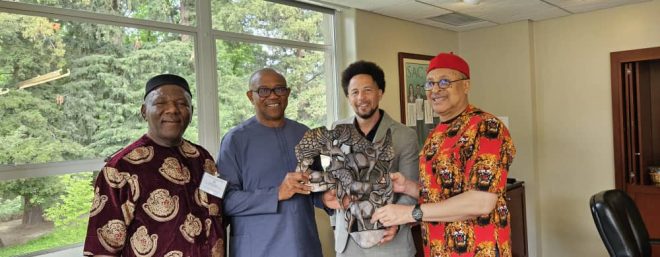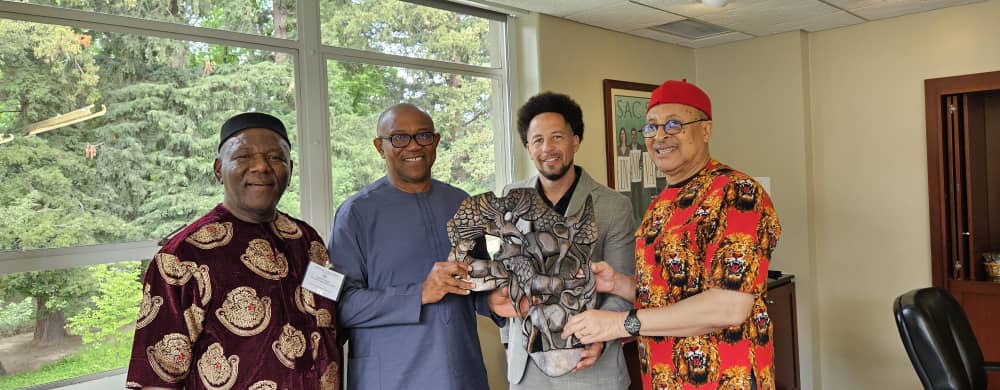
A Memorable Visit to California state University, Sacramento
On April 26, 2025, Peter Obi, a prominent Nigerian politician and former Governor of Anambra State, had the distinct honor of visiting California State University, Sacramento (CSUS). This visit was marked by a warm reception from the university’s President, Dr. Luke Wood, setting the tone for a meaningful engagement between Obi and the academic community. The visit not only highlighted the importance of international collaboration in education but also underscored the role of universities in fostering global dialogue on critical issues.
Warm Reception by President Dr. Luke Wood
Dr. Luke Wood, the president of CSUS, is known for his commitment to creating an inclusive and progressive educational environment. Under his leadership, the university has made significant strides in promoting diversity and supporting students from various backgrounds. Obi’s visit to CSUS was a testament to the strong relationships that exist between African leaders and American educational institutions. This meeting provided an avenue for discussing shared values, educational reform, and the potential for collaboration in various fields, including policy development and social justice initiatives.
Meeting with Professor Nicole Fox
Following the reception, Obi had the opportunity to meet with Professor Nicole Fox, a distinguished academic known for her work in post-genocide studies. Professor Fox is the author of "After Genocide," a poignant exploration of the aftermath of genocide and the paths to healing and reconciliation. Her work is particularly relevant in a global context, where issues of violence, displacement, and human rights continue to resonate. The discussion between Obi and Professor Fox encompassed the nuances of post-conflict recovery, the importance of education in fostering societal healing, and the role of academic research in addressing pressing societal challenges.
Importance of Education in Global Discourse
The visit of Peter Obi to California State University, Sacramento, highlights the critical role that education plays in shaping global discourse. Universities are not just centers of learning; they are also platforms for dialogue and collaboration across borders. By engaging with scholars like Professor Nicole Fox, leaders like Obi can gain insights into the best practices in education, governance, and community development. Furthermore, such interactions can lead to partnerships that enhance educational opportunities for students in both Nigeria and the United States.
- YOU MAY ALSO LIKE TO WATCH THIS TRENDING STORY ON YOUTUBE. Waverly Hills Hospital's Horror Story: The Most Haunted Room 502
The Role of CSUS in International Engagement
California State University, Sacramento, is an institution that prides itself on its commitment to diversity and international engagement. The university offers a range of programs aimed at fostering global citizenship among its students. Through partnerships with institutions around the world, CSUS provides students with opportunities to study abroad, participate in international research projects, and engage with global issues. The visit from Peter Obi aligns with the university’s mission to promote international understanding and cooperation.
Enhancing Cultural Exchange
Cultural exchange is another vital aspect of the visit. As Nigeria continues to grow as a significant player on the global stage, interactions with American institutions like CSUS can help bridge cultural divides. These exchanges allow for a sharing of ideas, traditions, and innovations that can benefit both countries. For students at CSUS, learning about Nigeria’s rich history and diverse cultures can broaden their perspectives and enhance their educational experience. Similarly, Nigerian students and academics can gain valuable insights from American educational practices and research initiatives.
Addressing Global Challenges Together
The discussions held during Peter Obi’s visit to CSUS also touched on several pressing global challenges, including climate change, economic development, and social justice. As nations grapple with these issues, the importance of collaborative efforts cannot be overstated. Educational institutions like CSUS play a crucial role in fostering research and innovation that can lead to sustainable solutions. By working together, countries can share knowledge and resources to tackle these challenges more effectively.
The Impact of Leadership on Education
Leadership plays a pivotal role in shaping the educational landscape. Leaders like Peter Obi, who have a strong commitment to education and social equity, can inspire change at multiple levels. Through his engagements with institutions like CSUS, Obi can advocate for policies that prioritize educational access and quality in Nigeria. Moreover, his presence at the university serves as a reminder of the importance of investing in education as a means of achieving long-term development goals.
Looking Ahead: Future Collaborations
The visit of Peter Obi to California State University, Sacramento, marks the beginning of what could be fruitful collaborations between Nigerian and American educational institutions. As both countries continue to face complex challenges, the exchange of ideas and resources will be essential in finding innovative solutions. Future partnerships could involve joint research initiatives, faculty exchanges, and collaborative academic programs aimed at addressing specific issues relevant to both contexts.
Conclusion
Peter Obi’s visit to California State University, Sacramento, was a significant event that highlighted the importance of education, cultural exchange, and international collaboration. With leaders like Obi advocating for educational reform and global dialogue, the future looks promising for partnerships between Nigeria and American institutions. As CSUS continues to foster an inclusive and diverse learning environment, it paves the way for future generations of leaders who will be equipped to tackle the challenges of an increasingly interconnected world. This visit serves as a reminder of the potential that lies in collaboration and the power of education to transform societies for the better.

Yesterday, I had the honour of visiting California State University, Sacramento, where I was warmly received by the President of the institution, Dr. Luke Wood.
Following the reception, I had the pleasure of meeting Professor Nicole Fox, author of After Genocide, a deeply moving… pic.twitter.com/yrUvZL6jfP
— Peter Obi (@PeterObi) April 26, 2025
Yesterday, I had the honour of visiting California State University, Sacramento, where I was warmly received by the President of the institution, Dr. Luke Wood.
It’s not every day that you get to visit a university and meet such remarkable individuals. My recent trip to California State University, Sacramento, was one of those unforgettable experiences that left me filled with inspiration and hope. The warm reception from President Dr. Luke Wood was truly heartwarming. It’s evident that he cares deeply about the university and its students, and his leadership reflects a commitment to fostering an inclusive and innovative academic environment.
Dr. Wood, who has been leading the institution with a vision for growth and inclusiveness, is shaping the future of higher education in California. Under his guidance, Sacramento State is not just a place for academic pursuit; it’s a community where students can thrive, learn, and prepare for their futures. The campus buzzed with energy, and the passion for education was palpable in every corner.
Following the reception, I had the pleasure of meeting Professor Nicole Fox, author of After Genocide, a deeply moving…
After the warm welcome from Dr. Wood, I had the distinct pleasure of meeting Professor Nicole Fox. She’s not just any professor; she’s the brilliant mind behind the book *After Genocide*. This book isn’t just a collection of words; it’s a powerful narrative that dives deep into the complexities of human experiences following devastating events. The title alone evokes a sense of urgency and importance, and speaking with her illuminated the nuances of her work.
Professor Fox has dedicated her career to studying the aftermath of conflict and genocide, focusing on healing and reconciliation. Her insights are not only academic but also deeply personal and poignant. During our conversation, she shared her perspective on the transformative power of education in healing communities torn apart by violence. You can feel her passion for her research as she discusses how knowledge can be a tool for change and a pathway to understanding.
It’s remarkable how she weaves her personal experiences and academic rigor into her teachings. She encourages her students to think critically about history and its implications on current societal issues. If you’re interested in the subject, I highly recommend checking out her book *After Genocide* for a deeper understanding of these complex themes.
The Importance of Educational Institutions in Today’s Society
Visiting California State University, Sacramento, reinforced the idea of education as a cornerstone of society. In times where misinformation can spread like wildfire, institutions like Sacramento State play an essential role in providing accurate information and fostering critical thinking. Dr. Wood’s leadership emphasizes this mission, creating a space for students to question, explore, and grow.
Moreover, the university’s commitment to social justice and community engagement is evident. It’s not just about earning a degree; it’s about making a difference in the world. Students are encouraged to participate in community service and engage with various social issues, which is so crucial in today’s landscape. This focus on civic responsibility prepares them not only for careers but also for life as engaged citizens.
The Role of Faculty in Shaping Student Experiences
The faculty at California State University, Sacramento, are not just educators; they are mentors and guides. Meeting Professor Fox highlighted the importance of having passionate professors who inspire students to pursue their interests and challenge their perspectives. Faculty members like her are invaluable in shaping the next generation of leaders.
In a world where students often feel overwhelmed by the pressures of academic life, the support and guidance from dedicated faculty can make all the difference. Professors who are genuinely invested in their students’ success create an environment where learning flourishes. This is particularly important in subjects that tackle difficult themes, such as those explored in *After Genocide*.
Students are encouraged to engage in meaningful discussions, reflect on their values, and challenge their assumptions, all of which are crucial skills in today’s interconnected world. The relationship between students and faculty at Sacramento State exemplifies the profound impact that educators can have on students’ lives.
Building a Community of Change-Makers
One of the standout aspects of my visit to California State University, Sacramento, was the sense of community. It’s not just a university; it’s a place where students from diverse backgrounds come together to learn and grow. This diversity enriches the educational experience, allowing students to learn from each other’s perspectives and experiences.
The university encourages collaboration and dialogue, fostering a sense of belonging among its students. This is crucial in developing future leaders who understand the importance of community and collaboration. In our ever-evolving world, having a network of change-makers ready to tackle societal challenges is more important than ever.
Students are not only educated academically but also socially, learning to appreciate and respect diverse viewpoints. This holistic approach to education is what sets Sacramento State apart. It prepares students to be thoughtful and informed citizens who can contribute positively to society.
Conclusion: The Future of Education at California State University, Sacramento
As I reflect on my visit, I can’t help but feel optimistic about the future of education at California State University, Sacramento. With leaders like Dr. Luke Wood and passionate educators like Professor Nicole Fox, the institution is on a path of growth and innovation. Their commitment to creating a nurturing environment for students is commendable and inspiring.
The focus on social justice, community engagement, and critical thinking ensures that students leave not just with degrees, but with the tools they need to make a difference in the world. Education is not merely a means to an end; it’s a lifelong journey of discovery and growth.
If you’re considering higher education or are just curious about the role of universities in shaping society, places like Sacramento State are a beacon of hope and progress. They remind us of the power of education to heal, transform, and inspire.
